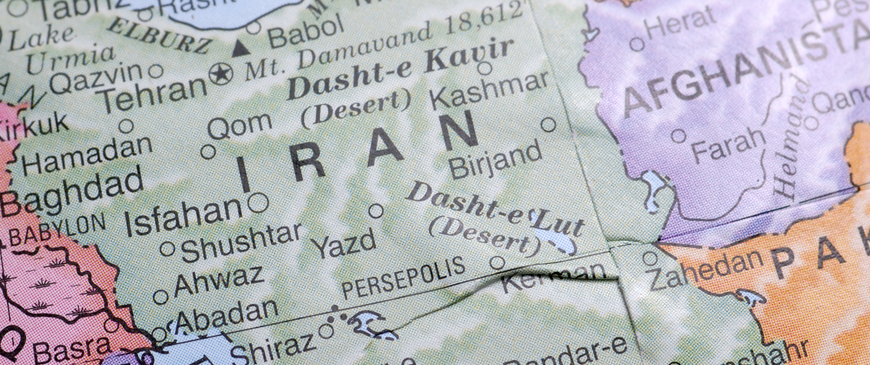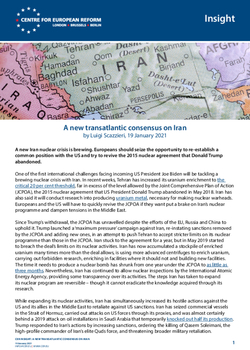
A new transatlantic consensus on Iran
A new Iran nuclear crisis is brewing. Europeans should seize the opportunity to re-establish a common position with the US and try to revive the 2015 nuclear agreement that Donald Trump abandoned.
One of the first international challenges facing incoming US President Joe Biden will be tackling a brewing nuclear crisis with Iran. In recent weeks, Tehran has increased its uranium enrichment to the critical 20 per cent threshold, far in excess of the level allowed by the Joint Comprehensive Plan of Action (JCPOA), the 2015 nuclear agreement that US President Donald Trump abandoned in May 2018. Iran has also said it will conduct research into producing uranium metal, necessary for making nuclear warheads. Europeans and the US will have to quickly revive the JCPOA if they want put a brake on Iran’s nuclear programme and dampen tensions in the Middle East.
Since Trump’s withdrawal, the JCPOA has unravelled despite the efforts of the EU, Russia and China to uphold it. Trump launched a ‘maximum pressure’ campaign against Iran, re-instating sanctions removed by the JCPOA and adding new ones, in an attempt to push Tehran to accept stricter limits on its nuclear programme than those in the JCPOA. Iran stuck to the agreement for a year, but in May 2019 started to breach the deal’s limits on its nuclear activities. Iran has now accumulated a stockpile of enriched uranium many times more than the deal allows, is using more advanced centrifuges to enrich uranium, carrying out forbidden research, enriching in facilities where it should not and building new facilities. The time it needs to produce a nuclear bomb has shrunk from one year under the JCPOA to as little as three months. Nevertheless, Iran has continued to allow nuclear inspections by the International Atomic Energy Agency, providing some transparency over its activities. The steps Iran has taken to expand its nuclear program are reversible – though it cannot eradicate the knowledge acquired through its research.
While expanding its nuclear activities, Iran has simultaneously increased its hostile actions against the US and its allies in the Middle East to retaliate against US sanctions. Iran has seized commercial vessels in the Strait of Hormuz, carried out attacks on US forces through its proxies, and was almost certainly behind a 2019 attack on oil installations in Saudi Arabia that temporarily knocked out half its production. Trump responded to Iran’s actions by increasing sanctions, ordering the killing of Qasem Soleimani, the high-profile commander of Iran’s elite Quds force, and threatening broader military retaliation.
While expanding its nuclear activities, Iran has simultaneously increased its hostile actions against the US and its allies in the Middle East.
Biden has said he wants to revive the JCPOA, if Iran returns to compliance with the agreement. Biden also wants to strengthen and extend the JCPOA’s limitations on Iran’s nuclear programme, and address other concerning issues not covered by the deal, like Iran’s aggressive foreign policy and its ballistic missile programme. But Biden and his team have said that reviving the JCPOA should be the priority and that other issues should be addressed later. France, Germany and the UK agree. For their part, Iranian leaders have stated that they want to return to the agreement, and are ready to do so if Washington removes sanctions. Iran’s expansion of its nuclear programme is a move to acquire leverage in negotiations and put pressure on the US to engage.
The approach of reviving the JCPOA before addressing other issues of concern has its shortcomings. It will be difficult for the US to push Iran to agree to prolong the JCPOA’s restrictions on enrichment or to limit its ballistic missile programme once most sanctions have been removed. Even if Europeans were to re-impose sanctions alongside the US, however, there is no guarantee that Iran would be willing to make additional concessions after a few more months of sanctions. Iran sees both its ballistic missile program and its support for proxies in the region as essential to compensate for the relative weakness of its conventional forces compared to Saudi Arabia, Israel, the UAE and the US. If the US and its partners do nothing to change Iran’s calculation, Tehran would continue enriching, therefore getting closer to acquiring a nuclear bomb. It would continue to respond to sanctions through military provocations, raising the risk of a military confrontation, while betting that its adversaries would back down first. Diplomacy would become more difficult: Iran will hold Presidential elections in June 2021, in which President Rouhani cannot run for a third term. Pro-deal forces have been weakened by the failure of the JCPOA, and the next President is quite likely to think that Iran would be more secure if it had a nuclear weapon, that the West cannot be trusted and that China and Russia will not side with the US.
Given these risks, it is easy to see why Biden wants to try reviving the JCPOA before addressing other issues. Sequencing a return to compliance will be difficult, however, as both the US and Iran want the other side to make the first move. Europeans could bridge that divide, helping both sides overcome their differences by setting out a plan for a phased return to compliance. Iran would first freeze and then gradually reverse the expansion of its nuclear activities; the US would allow Iran to sell progressively more of its oil, and gradually remove the sanctions that Trump re-imposed when the US left the JCPOA in 2018, as well as the additional sanctions he imposed later. Europeans can act as a channel of communications between the US and Iran, although direct US-Iranian dialogue will also be necessary. To facilitate this, Europe should urge the Biden administration to take symbolic steps to re-establish some trust as soon as it takes office, for example by stating that it intends to re-join the deal and removing sanctions on Iran’s foreign minister and other diplomats.
There will be several sets of obstacles to reviving the JCPOA. The first relates to Iranian politics and foreign policy. It is possible that Iran will carry out further provocations or take actions to expand its nuclear programme further in the next few weeks, making it politically difficult for Biden to re-join the deal. For example, Iran has threatened it will further expand its programme and curtail IAEA inspections unless Biden quickly lifts sanctions. There is a risk that Iran will insist on demands the US cannot meet, such as providing compensation for sanctions or removing all sanctions, including long-standing ones that remained in place even after the JCPOA was struck. Iran may also want cast-iron guarantees that the US will not leave the deal again, an assurance Biden could not provide, given that a future president would have the authority to abandon the agreement even if it was a treaty approved by Congress.
Iran has threatened it will further expand its programme and curtail IAEA inspections of it unless Biden quickly lifts sanctions.
The second set of obstacles relates to the tricky balance that Biden needs to find with Congress. Technically, Biden does not need Congressional approval to remove sanctions. But politically, there needs to be consensus behind the idea, as Biden will need legislators’ support to implement his domestic agenda and will not want to annoy Democrats that back a tough stance on Iran, such as Senators Bob Menendez and Chuck Schumer. Opponents of reviving the JCPOA think Biden should make use of the leverage existing sanctions provide to pressure Iran to get a better deal. It will be difficult for Biden to remove all sanctions, especially those imposed on the basis of Iran's support for terrorism. And if Iran carries out provocations against the US and its allies in the next weeks, or further expands its nuclear programme as it has threatened to do, it will be harder for Biden to ease sanctions. If Congress thinks Biden is being too soft on Iran, it could decide to tie his hands by adopting its own sanctions, which would be difficult for the administration to remove.
While there are substantial obstacles in the way of reviving the JCPOA, returning to the deal should be possible as long as both the US and Iran accept that they cannot seek additional concessions now. Nevertheless, it may turn out that Europe and the US are only able to secure a partial reversal of Iran’s expansion of its nuclear programme. This would still be a better outcome than a scenario where they had tried to clinch a better deal but failed, leaving Iran’s programme unchecked and making an agreement more difficult in the future. Even if a partial return to the deal proved impossible, the US would have shown its willingness to return to the deal and would find it easier to work with Russia, China and others to counter Iran’s nuclear programme.
Reviving the JCPOA would not change Iran’s foreign policy overnight. But it would limit its nuclear programme and reduce the risk of regional conflict. It would also provide a platform for talks on additional restrictions on Iran’s nuclear programme, and on limiting its ballistic missiles and its support for proxies in the region. Follow-on talks will be more complicated than reviving the JCPOA, even though they would take place in a less tense atmosphere. Iran has shown little appetite for negotiating additional limits, especially since the JCPOA failed to meet Tehran’s high expectations, with most European companies sceptical about doing business in Iran. But Iran is still hungry for the economic benefits of international trade. To secure additional concessions on Iran’s nuclear programme, therefore, Europeans and the US would have to tempt Tehran with additional economic benefits. The US could proactively help businesses understand the scope of its remaining sanctions, but Europeans would have to do the heavy lifting, increasing the volume of trade carried out through the INSTEX mechanism they set up in 2019 specifically to facilitate payments with Iran.
Reviving the JCPOA would not change Iran’s foreign policy overnight. But it would limit its nuclear programme and reduce the risk of regional conflict.
Realistically, the issue of Iran’s ballistic missiles can only be addressed after tension between Tehran and its regional rivals decreases, and only as part of a broader framework of regional arms control that involves them also agreeing to limits on their weaponry. Rather than prioritising a solution to the missile issue, the US and Europe should work to reduce tensions between Iran and Saudi Arabia by brokering a mutual end to their involvement in the conflict in Yemen, making it easier for the UN or another mediator to end the conflict. Biden has said he wants to reassess relations with Saudi Arabia, and that he will end support for its war in Yemen. This should encourage the Saudis to engage in dialogue with Iran. Europeans can contribute to de-escalation by fostering consultations between Iran and its Gulf rivals.
Even with Biden in power, the EU and US will not fully agree on how to address all the international challenges they face (policy towards, China, for example). But they both want to put a brake on Iran’s nuclear programme. They should work together to that end, and draw in the UK, which shares their aim. Europe and America should not hesitate: even if a full revival of the JCPOA cannot be engineered, few tasks are more urgent than preventing Iran from obtaining a nuclear weapon.
Luigi Scazzieri is a research fellow at the Centre for European Reform.


Add new comment